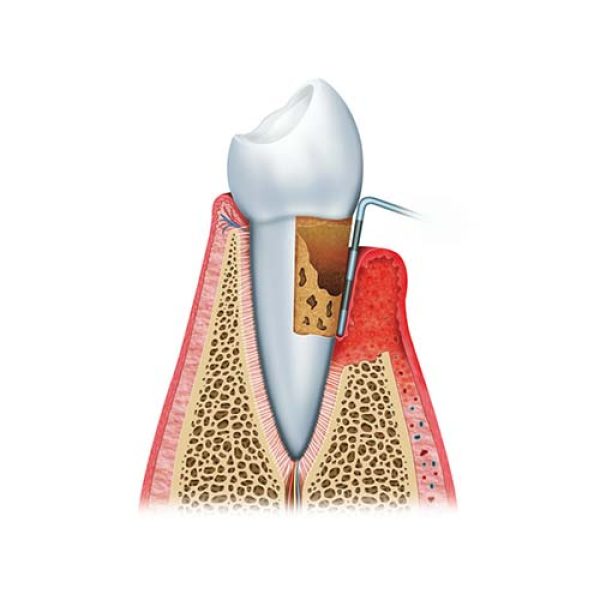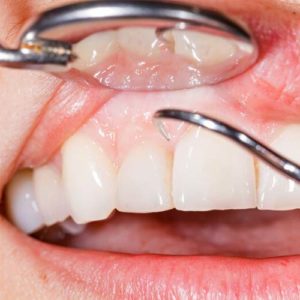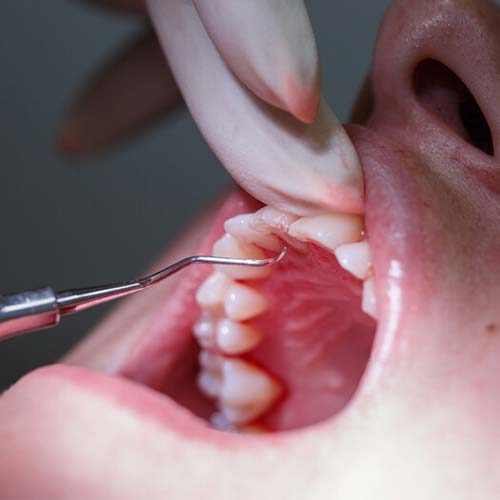Gum Disease
What is gum disease?
Gum disease (also known as Periodontal disease) is a common and often, painful, inflammatory condition which affects the gums.
It attacks the supporting and surrounding soft tissues of the tooth, and in advanced stages, can result in loss of teeth and even affect the jawbone.

What are symptoms of gum disease?
Bleeding
Often the most common symptom. Can occur without pain, and is produced when brushing, flossing or eating food.
Swelling
Including redness and also pain of the gums.
Gum recession
The appearance of longer looking teeth.
Bad breath
Caused by food particles get trapped under the gum line (known as Halitosis).
Loose teeth
Or inability to chew food due to the loosening and misplacement of teeth.
Pus
A sign of severe Periodontitis is when pus can be seen oozing out from the pockets or spaces around the teeth.
What are the causes of gum disease?
What types of gum disease are there?
Gingivitis
An inflammation of the gums. The first stage of gum disease is caused by the build-up of plaque. This produces toxins which irritate the gums making them tender red and inflamed. There is often a small amount of bleeding and is usually noticed by the patients who report seeing blood on their toothbrushes.Chronic Periodontitis
This is the most common form of periodontal disease seen amongst adults. Chronic Periodontitis is when the inflammation of the supporting tissue causes deep pockets and gum recession. Gum recession is usually visible and results in the appearance that the teeth are lengthening. which appear as though the teeth are lengthening. In actual fact this is the result of the gums (gingiva) shrinking and receding.Aggressive Periodontitis
Usually begins in childhood or early adulthood and affects only a small number of people. It tends to be a genetic disease but can affect people without a family history of the disease. Aggressive periodontitis causes rapid progression of bone loss and tooth loss if untreated.Necrotising Periodontal Disease
Characterised by the death of gum tissue, tooth ligaments and supporting bone caused by lack of blood supply (necrosis), resulting in severe infection. This type generally occurs in people with a suppressed immune system — such as from HIV infection, cancer treatment or other causes — and malnutrition.How do I to Prevent Gum Disease?
- Controlling build-up of plaque and tartar through daily brushing and flossing.
- Use the correct teeth cleaning methods and techniques.
- Use the correct aids such as toothbrushes, dental floss and mouth rinses.
- Have regular 6-monthly check ups and if necessary, periodontal maintenance at least twice a year from your dentist.
Your Gum Disease Treatment with Dr Finkelstein
Step 1
Assessment & Cleaning
Step 2
Preventative Treatment
Step 3
Grafting
Step 4
Pocket Elimination Surgery
Step 5
Teeth Replacement
If teeth have been lost due to periodontal disease, it is important to insert replacement teeth, ideally these are implanted into the jawbone in order to restore the functionality of the mouth. Tissue regeneration procedures to strengthen the jawbone may be necessary before the dental implant is placed.


Payment Options at Dr Finkelstein Dentist

- Visa & Mastercard - We do not charge you merchant fees on credit cards.
- Health Funds - We offer pay-the-gap only when you bring your health fund card along.
- Afterpay - Get treated now, pay later!
Are you concerned you may have gum disease?
Get a professional diagnosis with Dr. Finkelstein and make your mouth happy again.
Please complete the below form to chat with one of our friendly team. Once we receive your message, we will be in touch to answer any questions you have and book you in for an appointment. Alternatively, you can call us on (02) 9262 7778 or use our Online Chat between 8:00am until 5:00pm, Monday to Friday.
Get into the Finkelstein Files

Are Dental Crowns Permanent? Understanding Their Lifespan and Maintenance
Many people wonder whether dental crowns, used to restore weak or damaged teeth, are a permanent solution. The answer depends on various factors, including the

How Long Do Crowns Last? Expert Insight into the Lifespan and Maintenance of Dental Crowns Near You
Dental crowns, a renowned remedy for fortifying and enhancing the aesthetics of compromised teeth, stand as a prevalent choice among individuals seeking restoration. Curious about

TMJ Treatment Through Lifestyle Changes: Soft Foods, Stress Management, and More
Living with Temporomandibular Joint (TMJ) pain can significantly affect your daily routine, from eating to sleeping, making it crucial to find effective TMJ treatment. If



